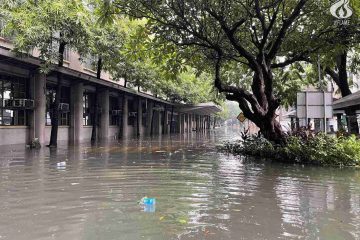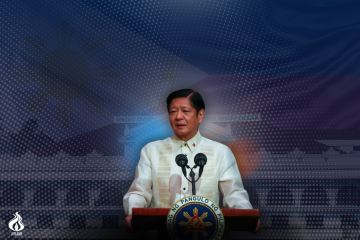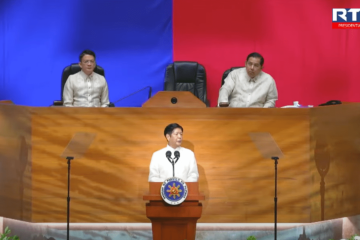AB ECONOMICS DEPARTMENT head Assoc. Prof. Carlos Manapat urged the Thomasian community to participate in the actions related to minimizing the adverse effects of the pandemic.
“Find opportunities to volunteer like being contract tracers and attend to the needy [by donating] cash if you have, your time, and things that you don’t use and things that you don’t need but are still useful,” Manapat said during a webinar on Friday.
“When the government said that the senior citizens [should not] go out, apektado talaga sila, especially, kung mag-asawang senior citizens. Now for us Thomasians, how can we help them? Well I think, in that case, a good example is we can go to their house and ask them if they need our help in buying groceries and medicine for example,” Manapat emphasized.
He also challenged Thomasians and student leaders to actively participate in the discussion of COVID-19 response and hold the government accountable for their actions.
“[You] should be participative in public hearings and lobbying [because] your voice will be heard through lobbying. You should also connect with your district representatives [kasi] open naman sila [sa pakikipanayam],” he said.
Meanwhile, Marikina City 2nd District Rep. Stella Quimbo emphasized the need to prioritize the welfare of the business owners and workers to regain the economic loss.
Her proposal House Bill No. 6815 seeks to approve a P1.5-trillion budget allocated to wage subsidies and loan allocations for Micro, Small, and Medium Enterprises.
“Kasama sa aming proposal ‘yung wage subsidies. As long as companies promised to keep their workers they will be receiving wage subsidies for two months.” Quimbo said.
“We [also] identified several financial institutions to give out interest-free loans kasama diyan ang Landbank [at] DBP (Development Bank of the Philippines),” she added.
Quimbo also identified that the government must allot and spend budget sustaining the actual loss of economic confidence.
“At a GDP contradiction of 6.6 percent, [there is an] estimated of 2.4 trillion pesos,” explained Quimbo.
She also noted that the government must release data-based evidence in order to properly address economic loss.
Sonny Africa, the executive director of IBON Foundation, focused his discussion on the analysis of the country’s economic status before the COVID-19 pandemic.
Africa said that the economic condition is weak even before the pandemic.
“We tend to get impressed with rapid economic growth. [However,] economic growth in itself is really not development,” said Africa.
According to him, the economic structure must provide job opportunities and must resolve poverty issues to show efficacy.
Africa mentioned that the country has shifted to a service economy from a production economy since the early 1990s.
“So right now we are more than 54 percent service [economy] in 2019 [as] compared to 26 percent production [economy] in 2019 as well,” he said.
He also emphasized that this recent shift has brought negative implications for employment.
“Job generation is actually weakening. We have been experiencing rapid growth since the 2000s, it is very striking that job generation is extremely falling in those periods of high growth. Bottom line, services will not create as many jobs from our natural resources and efforts as production,” he said.
“EKONdisyon: Philippine Economic Recession and Covid-19” is a webinar spearheaded by the UST Central Student Council. F



